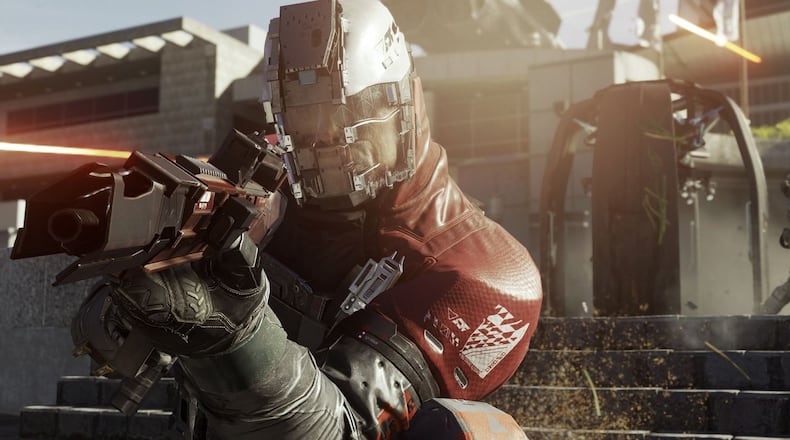Locally, at least 15 school threat cases have been filed in Warren County since the Parkland, Fla., school shooting killed 17 people in February. In at least two of those cases, defendants and lawyers made references to video games.
Research doesn’t link violent video games directly to acts of violence. Local experts, however, said studies have linked violent games to minor acts that are more rude or anti-social than violent.
Steven Liptak, a psychologist with Upper Valley Outpatient Behavioral Health, said video game violence could be considered a risk factor that might make violence more likely, but it is unlikely to be the single cause of a violent incident. Other factors can include peer rejection, poor self-control, bad school performance and lack of empathy for others.
“If you look at it from a common-sense perspective, there’s literally millions of people, not just kids, who play … first person shooter video games like Call of Duty, for example,” Liptak said. “Most of those people don’t turn out to be violent.”
Violent video games are one of several factors the National Rifle Association and politicians have brought up following school shootings. Politicians have also blamed Ritalin, the structure of school buildings and mental illness for mass shootings. Gun control advocates say those arguments serve to distract the public from the gun control debate.
A 13-year-old Mason boy acknowledged under questioning by Warren County Juvenile Court Judge Joe Kirby this month that he learned about the gun he threatened to shoot his teacher with from the video game “Call of Duty.” Kirby sentenced the boy for inducing panic after he admitted to threatening his teacher with a Glock when she reprimanded him for watching YouTube videos in class.
In March, a 16-year-old Clearcreek Twp. boy was charged with disorderly conduct after alluding to the game in an Instagram post following the Feb. 14 shooting at Marjory Stoneman Douglass High school in Parkland. He posted a picture of an Osprey gun and referenced a “killstreak” in the “Call of Duty: MW3 game,” comparing it to the Parkland shooting.
But research has yet to link school shootings, or any serious violence, to violent video games. America has a high rate of gun ownership and gun murders relative to other developed countries, but not a high rate of video game use, according to reporting by the New York Times.
Dr. Latisha Gathers-Hutchins, a pediatric psychologist at Dayton’s Children’s hospital, said studies have linked aggressive behavior to video game violence. The field defines aggression differently than violence; it’s a wider range of behavior that includes less serious harmful behavior.
“It could be something like yelling at someone or being mean, all the way up to violence,” she said.
RELATED: Documents: Piqua man, 21, made school shooting threat after girlfriend, 14, was bullied
Studies have concluded that violent video gaming can make people more likely to commit minor acts of aggression such as giving actors simulated electric shocks, loud noise blasts or very spicy hot sauce. Gathers-Hutchins said studying actual violence is difficult because violent acts are relatively rare and provoking them in a research setting is unethical.
She also said seeking a single cause of violent acts like school shootings is misguided. Violent acts tend to have multiple causes and risk factors, she said.
RELATED: Santa Fe High School Shooting: What to know about Santa Fe Independent School District
Callousness and disregard for human life is another risk factor for violence, and Liptak said more researchers should study whether violent media consumption decreases regard for human life.
“I think most people can kind of separate or compartmentalize,” Liptak said. “I think if they were to see something in real life, they would be affected by it. I do wonder if some of the violent video games, given how realistic they are, could be sort of a subtle risk factor because it could contribute to some callousness.”
Liptak said parents should make sure children are mature enough for the games they play and monitor the way their children and teens use video games. If children play video games to let off steam but are also involved in sports and doing well in school, the gaming is likely not a problem.
If a teen or child is becoming isolated, acting irritable and losing sleep because of the gaming, it could have negative health effects. Besides increased aggression, excessive gaming could lead to addiction or signal someone is depressed.
RELATED: School shootings: Mental health symptoms parents can watch out for
Gathers-Hutchins said risk of aggressive behavior increases with more violent video gaming. Research doesn’t suggest video games cause more aggression than passive consumption of violent media, so parents should consider their child’s consumption of violent television, movies and music as well.
A general rule of thumb for a healthy level of media consumption, violent or otherwise, is two hours or less per day, she said. Parents should know their children, though, and find a good individual level for them, she said.
Staff Writer Lawrence Budd contributed to this report.
About the Author
